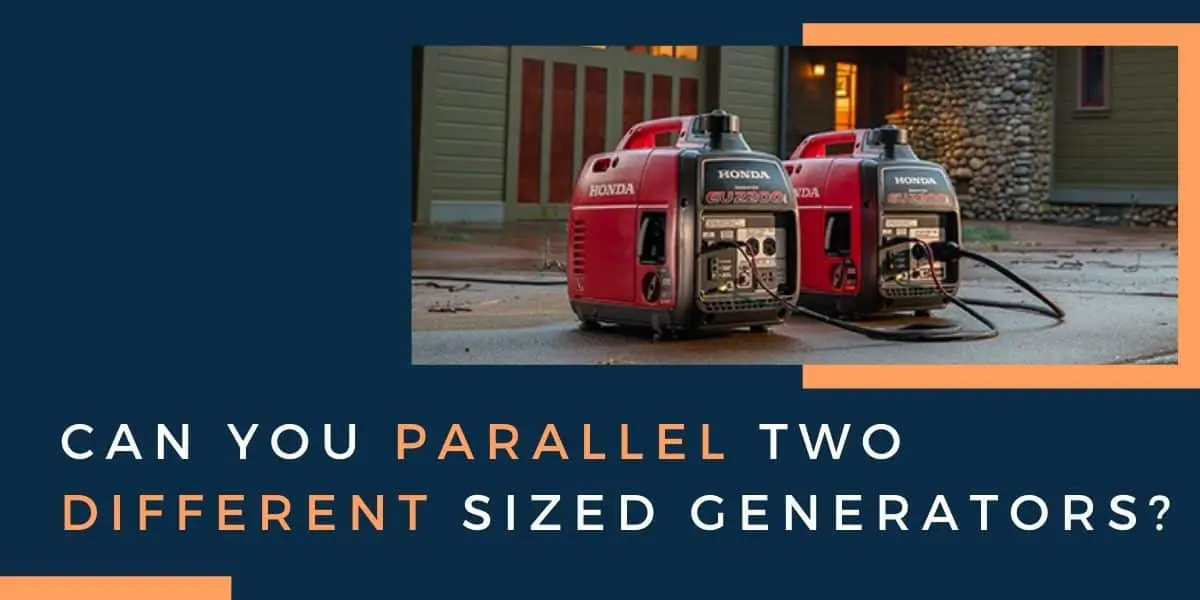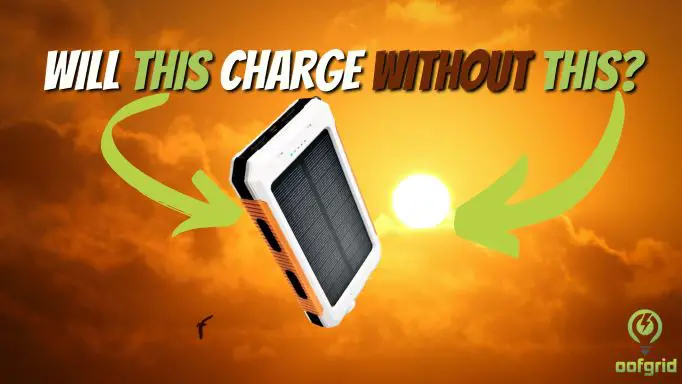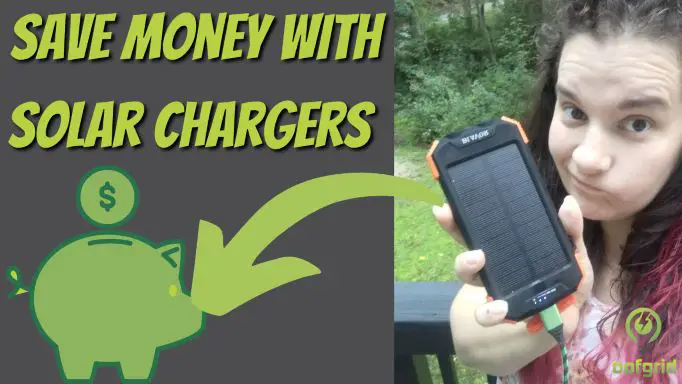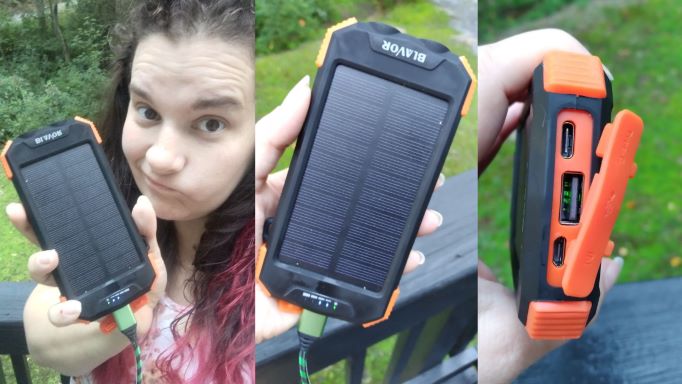At some point or another, you’re going to need more power, right? Well, connecting two generators in parallel is definitely the way to go. But it does get confusing — especially if you’re not sure whether you can parallel two different size generators.
Don’t worry, we’ve got all the answers. First, let’s dive into what paralleling generators is, and then we’ll move onto your burning question. Deal?
Contents
What Is Paralleling Generators?
It’s super simple — it simply means that you connect two generators in parallel which doubles the power output. For RVers, those living in mobile homes, and long camping trips, this is the best solution.
Typically, you’ll find it’s less complicated connecting generators that are the same size or the same brand (but we’ll get into that a bit later). But, as long as they are parallel compatible and you have a decent parallel kit, you are good to go.
Can You Parallel Two Different Sized Generators?
In short, yes, you can. Even if they are different brands too, you can still connect them in parallel. Of course, it does help if they are both parallel compatible already but there are ways around this potential problem.
It should be noted that the connection points of both generators need to have equal voltage and frequency. This will cause a lot of issues otherwise. Plus, they should both be inverter types of generators to ensure your endeavor is successful.

With all that being said, you must have a parallel kit to connect them. This is all impossible if you don’t have one! Regardless of the brand you buy, they will come with six terminals. Four of these are for plugging in your generators, leaving the final two for ground cables (which yes, they are necessary).
So, what if your generators aren’t already parallel capable? The procedure for connecting them is a little different. We’ll go over that briefly now, just in case you’re in this position.
To begin, plug the output port of the non-parallel compatible generator into the other generator. After that, connect the appliance into the parallel compatible generator. Then, simply turn on the non-parallel generator first and the second generator afterward. And that’s it! Yep, wasn’t so hard, right?
How to Connect Generators in Parallel
Let’s back up a bit! We just discussed running generators in parallel where one is not already capable of this. Now, we’re going to do a 180 and give you the process for connecting two different size generators when they are both compatible.
Step One
Ensure both of your generators have the parallel compatibility (you know what to do if they aren’t).
Step Two
Grab your parallel kit. While you can use a parallel cable, you’ll find the kit to be far easier.
As we mentioned earlier, the kit will have six terminals. Again, four of these are power plugs and the other two are for the ground leads.
Step Three
At this stage, you need to take a good look at the plus-minus sign on the parallel port of your generator. Then, read the manual that came with your kit to see which cable should be plugged in which port. Remember to connect the ground ports and away you go!
Don’t stress, you do not have to keep an eye on the power of each generator. Thankfully, if your generator already has parallel abilities, it automatically boosts or decreases its production of power. We don’t need to tell you how important this is!
Unfortunately, not many generators come with a parallel capability. Generally, it will only be medium or small models that come with this feature. Why? Because they aren’t capable of producing enough power for most RVers and avid campers.
What Is The Load Sharing When Running Two Different Sized Generators in Parallel?
Once you have connected your generators in parallel, the load is distributed equally between the two. The term for is load sharing which you have probably heard before. By professionals, this is called KVAR (Kilo Volt Ampere Reactive) or kW if they are calculating the specific divisions.
The parallel kit monitors the load share so it stays equal, regardless of what appliance the generators are running. When the demand increases, the generators will both burn more to match. This way, you won’t have to deal with any overloaded units and instability in your system.
Where Can You Buy Parallel Kits?
Nowadays, pretty much everything can be bought online — and parallel kits are no exception. Amazon offers tons of different brands that are great for various sizes of generators.
If you are finding it hard to find the right one for you (understandable, since there are so many on the market), we suggest you go with one of the following.
Firman 1201 Parallel Kit
- Equipped with a standard 50A RV outlet
- Seamlessly integrates two 2500-watt or higher Champion inverters with a quick clip-on connection
- Connecting two generators gives you enough power to start and run two 15,000 BTU RV air conditioners
- 120V 50A RV (14-50R) and 120V 30A locking outlets (L5-30R), plus 30-amp and 50-amp circuit breakers to prevent...
- Includes 1-year limited warranty with FREE lifetime technical support from dedicated experts
Last update on 2025-09-15 / Affiliate links / Images from Amazon Product Advertising API
Usually, brands that make parallel kits will try to push the sale of their own generators along with it; so much so that they say the kit won’t work with anything else. Our advice? Ignore this! It will work with the two different size generators you have, regardless of the brand.
WEN Parallel Kit
- Connect two WEN Inverter Generators for up to 30 amps and 3600 watts of output
- Includes one RV-ready 120V outlet (TT-30) and one twist-lock 120V outlet (L5-30)
- Easily mount the parallel kit to the top of a WEN Inverter Generator
- Features a reach of up to 7 feet and a two-year warranty
- Perfect for the WEN inverter generator series, including models 56125i, 56200i, 56202i, and 56225i
Last update on 2025-09-15 / Affiliate links / Images from Amazon Product Advertising API
The WEN parallel kit comes with a 2-year warranty (Firman only offers a 120-day warranty) and a 7-foot reach. It is a fantastic choice for avid campers, RVers, and those of you who live in mobile homes. Plus, its simplistic design makes for astounding user experience.
What Else Should You Consider?
We’ve covered the basics of running two different size generators in parallel. But, there are some other factors you need to think about before you get too carried away!
One: The Engine
You need to make sure that both of your generators have the same kilowatt capacity so that no system overloads will occur.
Having said this, you can get away with connecting two different ones. If you are doing this, make sure you take into account the capacity of the smallest generator as this will be your maximum power-producing capability.
Two: The Alternator
As long as the current isn’t traveling in the wrong circuits, you should be fine. Relays are installed into the alternator that prevent problems with this, but, just like anything, it can affect how your setup runs.
Three: The Load Sharing
We stated before that you need to make sure the frequency and voltage of both your generators are the same. This is because as soon as you turn on the system, you can’t keep an eye on the current or voltage to balance it out. If the devices realize they are unbalanced, they experience uneven distribution which can cause a whole world of issues.
Four: The Interface
New generators communicate with each other seamlessly, so you don’t have to worry about anything while they’re in parallel. However, older generators have to be manned constantly which, as you can imagine, is a pain! Just make sure you have two modern generators and you’ll be okay.
The Bottom Line
As you now know, connecting two different size generators in parallel is simple! All you need to do before you get started is to check that the voltage and frequency at the connection points are the same. It’s as easy as 123!








